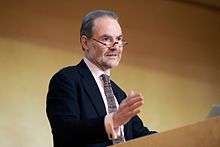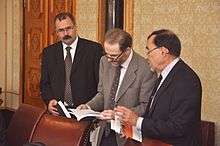Timothy Garton Ash
| Timothy Garton Ash | |
|---|---|
 Timothy Garton Ash delivering the Central European University's President's Lecture in February 2017 | |
| Born |
12 July 1955 London |
| Nationality | British |
| Alma mater | University of Oxford |
Timothy Garton Ash CMG FRSA (born 12 July 1955) is a British historian, author and commentator. He is Professor of European Studies at Oxford University. Much of his work has been concerned with the late modern and contemporary history of Central and Eastern Europe.
He has written about the Communist regimes of that region, their experience with the secret police, the Revolutions of 1989 and the transformation of the former Eastern Bloc states into member states of the European Union. He has examined the role of Europe and the challenge of combining freedom and diversity, especially in relation to free speech.
Education
Garton Ash was born to John Garton Ash (1919-2014) and Lorna Judith Freke. His father was educated at Trinity Hall, Cambridge and was involved in finance, as well as being a Royal Artillery officer in the British Army during the Second World War.[1] Garton Ash was educated at St Edmund's School, Hindhead, Surrey,[2] before going on to Sherborne School, a well-known public school in Dorset in South West England, followed by Exeter College, Oxford where he studied Modern History.
For post-graduate study, he went to St Antony's College, Oxford, and then, in the still divided Berlin, the Free University in West Berlin and the Humboldt University in East Berlin. During his studies in East Berlin, he was under surveillance from the Stasi, which served as the basis for his 1997 book The File.[3] Garton Ash cut a suspect figure to the Stasi, who regarded him as a "bourgeois-liberal" and potential British spy.[4] Although he denies being a British intelligence operative, Garton Ash described himself as a "soldier behind enemy lines" and described the German Democratic Republic as a "very nasty regime indeed."[4]

Life and career
In the 1980s, Garton Ash was Foreign Editor of The Spectator and a columnist for The Independent. He became a Fellow at St Antony's College in 1989, a senior fellow at Stanford University's Hoover Institution[5] in 2000, and Professor of European Studies at the University of Oxford[6] in 2004. He has written a weekly column in The Guardian since 2004 and is a long-time contributor to the New York Review of Books.[7] His column is also translated in the Turkish daily Radikal[8] and in the Spanish daily El País, as well as other papers.
In 2005 Garton Ash was listed in Time Magazine as one of the 100 most influential people.[9] There it is mentioned that "Shelves are where most works of history spend their lives. But the kind of history Garton Ash writes is more likely to lie on the desks of the world's decision makers."
Geopolitics
Garton Ash describes himself as a liberal internationalist.[10] He is a supporter of what he calls the "free world" and liberal democracy, represented in his view by the European Union, the United States as a super-power and Angela Merkel's leadership of Germany. Garton Ash opposed Scottish independence and argued for Britishness, writing in The Guardian: "... being British has changed into something worth preserving, especially in a world of migration where peoples are going to become ever more mixed up together. As men and women from different parts of the former British empire have come to live here in ever larger numbers, the post-imperial identity has become, ironically but not accidentally, the most liberal, civic, inclusive one."[11]
Garton Ash first came to prominence during the Cold War as a supporter of free speech and human rights within countries which were part of the Soviet Union and Eastern Bloc, paying particular attention to Poland and Germany. In more recent times he has represented a British liberal pro-EU viewpoint, nervous at the rise of Vladimir Putin, Donald Trump and Brexit. He is strongly opposed to conservative and populist leaders of EU nations such as Viktor Orbán of Hungary, arguing that Merkel should "freeze him out", evoking "appeasement."[12] Garton Ash was particularly upset about Orbán's move against George Soros' Central European University.[12] Anti-Soviet themes and Poland remain topics of interest for Garton Ash; once a promoter of the anti-Eastern Bloc movement in Poland, he notes with regret the move away from liberalism and globalism towards populism and authoritarianism under socially conservative political and religious leaders such as Jarosław Kaczyński, in a similar manner to his criticisms of Hungary's Orbán.[13]
Personal life
Garton and his Polish-born wife Danuta live primarily in Oxford, England, and also near Stanford University in California as part of his work with the Hoover Institution.[14] They have two sons, Tom Ash, a web-developer based in Canada, and Alec Ash, a writer living in China.[14] His older brother Christopher is a Church of England clergyman.
Bibliography
- Free Speech: Ten Principles for a Connected World (Yale University Press, 2016) ISBN 9780300161168
- Facts are Subversive: Political Writing from a Decade without a Name (Atlantic Books, 2009) ISBN 1-84887-089-2
- Free World: America, Europe, and the Surprising Future of the West (Random House, 2004) ISBN 1-4000-6219-5
- History of the Present: Essays, Sketches, and Dispatches from Europe in the 1990s (Allen Lane, 1999) ISBN 0-7139-9323-5
- The File: A Personal History (Random House, 1997) ISBN 0-679-45574-4
- In Europe's Name: Germany and the Divided Continent (Random House, 1993) ISBN 0-394-55711-5
- The Magic Lantern: The Revolution of 1989 Witnessed in Warsaw, Budapest, Berlin, and Prague (Random House, 1990) ISBN 0-394-58884-3
- The Uses of Adversity: Essays on the Fate of Central Europe (Random House, 1989) ISBN 0-394-57573-3
- The Polish Revolution: Solidarity, 1980–82 (Scribner, 1984) ISBN 0-684-18114-2
- Und willst du nicht mein Bruder sein ... Die DDR heute (Rowohlt, 1981) ISBN 3-499-33015-6
Awards and honours
- Somerset Maugham Award, for The Polish Revolution: Solidarity (1984)
- Prix Européen de l'Essai Charles Veillon (1989)
- Premio Napoli, for journalism (1995) [15]
- Order of Merit from the Czech Republic
- Order of Merit from Germany [16]
- Order of Merit of the Republic of Poland
- Honorary doctorate from St Andrew's University, Scotland
- Hoffmann von Fallersleben Prize for political writing (2002)
- Companion of the Order of St Michael and St George (CMG)
- Orwell Prize for journalism (2006)
- Kullervo Killinen -prize from Finland (2006)
- Honorary doctorate from Katholieke Universiteit Leuven, Belgium[17]
- Fellow of the Royal Society of Arts (FRSA)
- Charlemagne Prize (2017)[18]
See also
Notes
- ↑ "John Garton Ash - obituary". The Telegraph. Retrieved 12 January 2017.
- ↑ "St. Ed's - OSE". saintedmunds.co.uk. Retrieved 2016-04-23.
- ↑ Ash, Timothy (2007-05-31). "The Stasi on Our Minds". The New York Review of Books. Retrieved 2014-11-17.
- 1 2 "Memoirs of an inadvertent spy". The Independent. Retrieved 12 January 2017.
- ↑ "Fellows: Timothy Garton Ash". Hoover Institution. Retrieved 12 November 2011.
- ↑ "Governing Body Fellows: Professor Timothy Garton Ash". St. Anthony's College. Retrieved 12 November 2011.
- ↑ "Timothy Garton Ash". The New York Review of Books. Retrieved 12 November 2011.
- ↑ "timothy garton ash son dakika gelişmeleri ve haberleri Radikal'de!". Radikal (in Turkish). Retrieved 2016-04-23.
- ↑ Ferguson, Niall (18 April 2005). "Timothy Garton Ash". TIME.com. Retrieved 2016-04-23.
- ↑ "Liberal internationalists have to own up: we left too many people behind". The Guardian. Retrieved 12 September 2017.
- ↑ "Independence for Scotland would not be good for England". The Guardian. Retrieved 12 September 2017.
- 1 2 "We know the price of appeasement. That's why we must stand up to Viktor Orbán". The Guardian. Retrieved 12 September 2017.
- ↑ "The pillars of Poland's democracy are being destroyed". The Guardian. Retrieved 12 September 2017.
- 1 2 "Biography". timothygartonash.com. Retrieved 12 November 2011.
- ↑ "Premio di Giornalismo". premionapoli.it.
- ↑ "Timothy Garton Ash :: Biography". timothygartonash.com.
- ↑ "Eredoctoraten voor Maria Nowak, Timothy Garton Ash en Claudio Magris". Dagkrant Katholieke Universiteit Leuven (in Dutch). 22 December 2010. Retrieved 12 November 2011.
- ↑ europeonline-magazine.eu, europe online publishing house gmbh -. "Historian Garton Ash receives Germany's Charlemagne Prize 2017 | EUROPE ONLINE". en.europeonline-magazine.eu. Retrieved 2017-01-22.
External links
| Wikiquote has quotations related to: Timothy Garton Ash |
- Official Website
- Articles by Timothy Garton Ash at Journalisted
- Column archives at The Guardian
- Dahrendorf Programme for the Study of Freedom
- Free Speech Debate
- Appearances on C-SPAN
- Timothy Garton Ash on Charlie Rose
- Works by or about Timothy Garton Ash in libraries (WorldCat catalog)
- Garton Ash on Facts Are Subversive
- In dialogue with Aung San Suu Kyi
- Stanford public lecture